Mercados
Al diseñar una intervención humanitaria y decidir si se utilizan los PTM, el análisis de mercado debe ser parte del análisis global de la respuesta. Se ha demostrado que apoyar a los mercados para que funcionen bien conduce a una recuperación más rápida y a una mayor resiliencia en zonas afectadas por desastres.
Muchas organizaciones han invertido en el desarrollo de herramientas de apoyo para el análisis de mercado y están considerando la programación basada en el mercado de forma más integral. Esto incluye intervenciones que utilizan los mercados (como las transferencias en efectivo a poblaciones afectadas), así como intervenciones que apoyan directamente a los mercados (como subvenciones condicionales a los comerciantes para recuperar su mercado y mantenerlos funcionando).
Iniciativas relacionadas
Contenido destacado

Introduction to Market Analysis
Curso
This 30 minute online course provides an introduction to the analysis of markets in emergency contexts, with input from some of the world’s leading thinkers on the topic.

A Practical Guide to Market Analysis in Humanitarian response
Curso
A three to four hour online course designed to provide future humanitarian market assessment team members with a solid understanding of theory and steps of market assessments so that they can join assessment teams prepared with a basic understanding of what they will be doing and why.
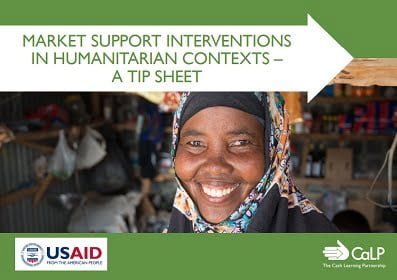
Market Support Interventions in Humanitarian Contexts – a Tip Sheet
Guidelines and Tools
This tip sheet defines what market support programming in humanitarian contexts is, and what it can look like in practice. It enables humanitarian practitioners to systematically consider market support interventions alongside other programme activities. The scope includes support interventions focusing on supply/availability and on demand/access. The tip sheet is based on secondary data...
Líder temático
Últimos recursos

Micro-level changes in market recovery and growth: The Ebola CTP experience
Webinar recording
Following our Ebola dissemination event in Dakar, the CALP Network hosted a webinar looking at the micro level effects of cash transfers on local economies during the Ebola crisis. Listen to the recording here.

ERC Learning Event: Scaling up our tools and approaches for multi-purpose cash grants
Blog Post
Watch the videos and read the recommendations from the ERC MPG Consortium event in Addis Ababa, Ethiopia.
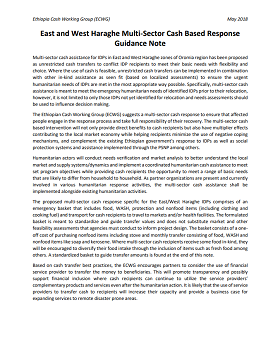
East and West Haraghe Multi-Sector Cash Based Response Guidance Note
Guidelines and Tools
Multi-sector cash assistance for IDPs in East and West Haraghe zones of Oromia region has been proposed as unrestricted cash transfers to conflict IDP recipients to meet their basic needs with flexibility and choice. Where the use of cash is feasible, unrestricted cash transfers can be implemented in...
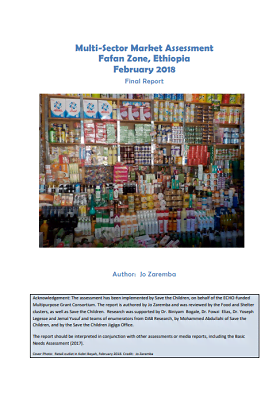
Multi-Sector Market Assessment Fafan Zone, Ethiopia
Report
This report covers the findings of the Multi-Sector Market Assessment (MSMA) conducted in Fafan Zone, Ethiopia in February and March 2018. The assignment formed part of the ERC-MPG Consortium on Approaches to Transformative Humanitarian Cash Transfer programming and is intended to support joint,...

Cash and Markets Working Group Strategic Workshop Report – Libya
Report
On the 6th and 7th of February 2018, a two days meeting opened to the members of the CMWG, Sector Leads, World Bank, UNSMIL, OCHA and Donors was held in Tunis to review the achievements, gaps and challenges of cash programing and articulate the 2018 humanitarian Cash Strategy for Libya. Supported by a...

A Meeting of Cash Working Group Leads: Sharing Experiences and Learning from Burundi, Ethiopia, Kenya, Madagascar, Tanzania, Somalia, South Sudan, Sudan and Tanzania
Report
Cash Working Group (CWG) leads from nine countries came together to share experiences and learn from one another. This report brings together observations and reflections from the meeting. It provides insights that are likely to be of interest to anyone involved in CWGs or discussions about the...

Review of Food for Peace Market-Based Emergency Food Assistance Programs: Sierra Leone Case Study Report
Report
Sierra Leone represents a remarkable experiment in market-based emergency programming using unconditional cash transfers and some conditional cash transfers Sierra Leone reflects the challenges of providing food assistance in the wake of a major infectious disease epidemic. Food insecurity increased due...

Understanding Market Drivers in Syria
Report
Study conducted by the SIM Consortium (Syria Independent Monitoring) in partnership with iMMAP, commissioned by DFID (report initially released in January 2018). This report documents the findings of an in-depth assessment of the olive/olive oil and spice/herb market systems in northeastern and...

Review of Food for Peace Market-Based Emergency Food Assistance Programs: Zimbabwe Case Study Report
Report
Zimbabwe reflects the recent Southern African drought crisis during a period of a regional El Niño-related drought and a national cash crisis. The United States Agency for International Development (USAID) Office of Food for Peace (FFP) funded a mix of programming between fiscal years 2011 and 2015,...

Market Support Interventions in Humanitarian Contexts – a Tip Sheet
Guidelines and Tools
This tip sheet defines what market support programming in humanitarian contexts is, and what it can look like in practice. It enables humanitarian practitioners to systematically consider market support interventions alongside other programme activities. The scope includes support interventions focusing...
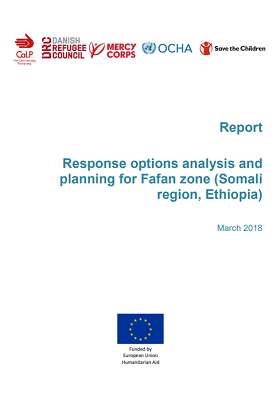
Response options analysis and planning for Fafan zone (Somali region, Ethiopia)
Guidelines and Tools
Between October 2017 and March 2018, the Consortium began the pilot in Ethiopia with the aim of providing technical and strategic support to country-based humanitarian organisations, enabling them to engage in collaborative assessments and decision making. Whilst the Consortium has not been conceived to...
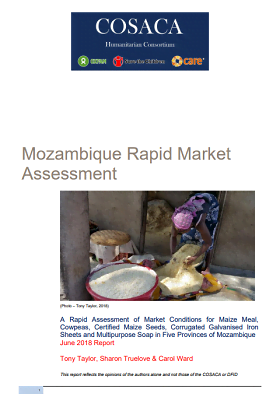
Mozambique Rapid Market Assessment
Report
Mozambique is a country prone to natural disasters, most markedly floods, cyclones, pest and disease outbreaks and frequent droughts. These regularly exacerbate the underlying poverty and food security situation and cause major damage and set back economic growth in disaster-affected areas. Meteorological...

Basic Needs Assessment Guidance & Toolbox Part 2: How-to Guide & Tools
Guidelines and Tools
This How-to Guide is Part 2 of the BNA Guidance & Toolbox, with Part 1 describing the background and concepts underpinning the BNA approach.
The How-to Guide describes the sequence of practical steps necessary to ensure a successful BNA during emergencies, from initiation of the BNA up to reporting and...

Reviewing the Linkages between Gender, Market Assessments and Market-based Interventions
Report
From ‘Collected Papers on Gender and Cash Transfer Programmes in Humanitarian Contexts’. Existing gender inequalities mean that disasters and conflicts impact women, men, girls and boys differently. Cash based assistance is one of the most significant developments in humanitarian assistance in recent...

Lessons Learnt and Recommendations for Cash-for-Shelter Programmes in the Democratic Republic of Congo
Report
This document provides an overview of how cash and voucher assistance is being used by shelter partners in DRC and details the lessons learnt to-date. It goes on to put forward recommendations and opportunities to strengthen cash and market-based programming in the shelter/housing sector there. An...

La Asistencia Alimentaria Basada en el Mercado en Guatemala: Una Sistematización de Experiencias
Guía y herramientas
En abril de 2017, a solicitud de la oficina de Alimentos para la Paz (FFP) de la Agencia Internacional de Desarollo de los Estados Unidos (USAID), Catholic Relief Services (CRS) y Project Concern International (PCI) en Guatemala diseñaron un proceso para recopilar y sintetizar las experiencias de...

Caja de Herramientas: Implementación de Programas de Efectivo y Cupones
Guía y herramientas
Este conjunto de herramientas, desarollado por PCI, no pretende ofrecer una guía completa sobre diseño e implementación de programas de transferencias monetarias, sino más bien busca armonizar los enfoques, mecanismos, y el lenguaje para su uso por los equipos involucrados en el diseño...
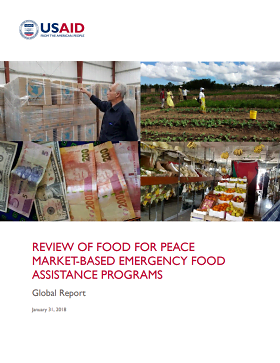
Review of Food for Peace Market-Based Emergency Food Assistance Programs Global Report
Report
Efficient and effective use of humanitarian funds is critical to meet the emergency needs of as many people as possible, especially as emergencies in developing countries have become more numerous, complex, and protracted. The United States Agency for International Development (USAID) Office of Food for...

Review of Food for Peace Market-Based Emergency Food Assistance Programs: Democratic Republic of Congo Case Study Report
Report
The Democratic Republic of Congo (DRC) case illustrates the complexity and diversity of contexts within which program design and implementation occurs. It highlights the need for provincial-scale assessments, local market monitoring, and flexibility to pivot to different modalities depending on changing...
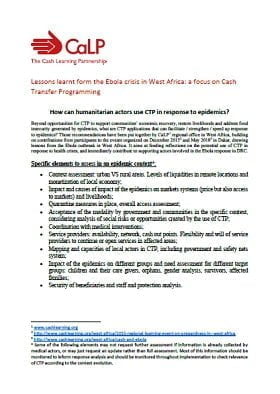
Lessons Learnt from the Ebola Crisis in West Africa: a focus on Cash Transfer Programming
Report
Beyond opportunities for CTP to support communities’ economic recovery, restore livelihoods and address food insecurity generated by epidemics, what are CTP applications that can facilitate / strengthen / speed up response to epidemics? Those recommendations have been put together by the CALP Network...



